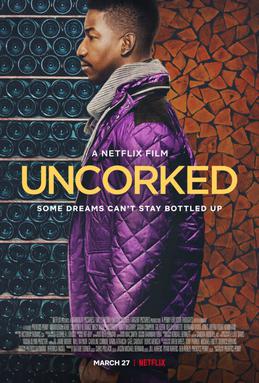‘Uncorked’ finally combats the issue of self-determination in the black family

“Uncorked” follows a young man, Elijah, as he tries to follow his own dreams as a master sommelier.
April 16, 2020
The black community has struggled with the concept of self-determination since Reconstruction. We see this in the history books with Booker T. Washington, W.E.B DuBois, Martin Luther King, Jr. and Malcom X. The black community has overcome a lot of external injustices such as hiring and voting discrimination and segregation. While overcoming these struggles, the black community developed and trademarked the culture we know today.
From the classic Southern barbeque to “Chicago-steppin” to the 70s afro, blacks created a “norm” within their own society that subsequent generations were expected to abide by. Nevertheless, time brings about a change of ideas and perspectives, but some older generations haven’t, and aren’t, feeling these changes. A lot of Baby Boomers–and even millenials–have a set picture of success, and when their descendants decide to paint a new picture of success for themselves, problems arise within the black family unit.
The 2020 Netflix film “Uncorked” presents this exact issue in the life of Elijah, a 20-something black man from Memphis with a knack for wines. Elijah’s father, Louis, is the second-generation owner of the family’s barbeque restaurant who is pushing for Elijah to take over the business. Right away, one can see that Elijah is torn between the life that he would like to achieve and the life that his father wants for him.
This narrative of “choosing the lucrative or ‘safe’ career” is prevalent within the black community, even now. I have seen the rifts and the strife that are results of children choosing their own destinies that defy what their parents have envisioned for them. More often than not, black males face these interfamilial struggles more than black females because they are less likely to attain an associate’s degree or bachelor’s degree, an element of this “pictured success” of the parent. Most films show this struggle of accepted self-determination between generations with the end result proving the parental generation right and leaving the younger generation miserable and aloof.
“Uncorked” does the exact opposite. Right from the opening scenes, one can see the joy radiating from Elijah as he does anything wine-related. Describing the taste, the color, the tones and even the origin of the grapes gives him a joy that cutting ribs and choosing firewood can’t. Instead of his father acknowledging that the love for the barbecue business isn’t there for Elijah, Louis keeps attempting to further push him into it, straining their relationship.
Announcing the news of pursuing sommelier school to his family presented him with no real support except from his mother, Sylvia, who is in cancer remission; despite this, he entered school. From schooling to studying to working in the family restaurant, Elijah was managing a lot of responsibilities, yet he remained steadfast in wanting to accomplish his goal. Before going to Paris to be further challenged in his studies and immersed into the culture of wines, he and Louis have an argument. Louis accuses Elijah of “trying to be better than the family,” and Elijah calls Louis “stuck in the barbeque” business. This is the narrative that is ever-present within the black household–and the one narrative I don’t think will ever leave no matter how much healing we achieve.
Most black parents have done the best they could with what they had, and they won’t hesitate to let you know either. Most baby boomers were lucky to attend and graduate college and get well-paying jobs to receive a salary, not wages. Each generation after that was supposed to gain inspiration from the previous one to do what they couldn’t do or didn’t have the gumption to do. Some couldn’t find that courage, so they stuck with what they knew. They were comfortable. Others choose to venture into uncharted territories to blaze a new path, which led to discord in the family–the same discord present in the movie.
After Sylvia’s death from cancer recurrence, Elijah lost his main support, and his journey of becoming a Master Sommelier became bleak. He drew back into his comfortability box to appease his father, and this involved withdrawing from sommelier school and diving head-first into the family barbeque business. Immediately seeing this, I knew this was a way to help Elijah grieve, but Louis couldn’t see this because he was grieving as well.
After re-enrolling in school and managing the daily happenings of the restaurants, Elijah was in a brief identity crisis of trying to figure out what truly makes him happy. The remedy ended up being Louis finally accepting and acknowledging the path he wants for Elijah is not the path that Elijah wants for himself.
Unfortunately, this movie did not have the traditional fairytale ending because if it did, Elijah would have passed the Master Sommelier exam. He didn’t pass. Instead, he decided to use his failure as experience and a stepping stone. The movie closes with him in class, doing what he does best: analyzing wine.
Watching the toilsome journey of a black man from Memphis achieving his dreams in this movie has been the highlight of my quarantine. I’ve watched this movie over five times already, and each time I watch it, I uncover a new element in my ever-growing appreciation and admiration for this film.
Memphis barbecue may be satisfying to the soul, but it’s not for everyone, especially Elijah. From watching this movie, I found out what is for everyone: the willingness to “uncork” his/her undying passion for what he/she loves to achieve his/her dreams no matter the costs.
Healing from manifested generational trauma like the issue of self-determination will not happen overnight. Nonetheless, “Uncorked” shows that black people can heal family scars and achieve their dreams while battling the curveballs that life throws, and I’m here for it.
This is the narrative we need to see more of.










Quita Harris • Apr 20, 2020 at 11:56 am
Madison I am so proud of you. I have watched this movie twice already and I’m sure I’ll be watching it again. I definitely thought it would end differently but in the end there was a great message to us all. Never give up on your dream no matter what the circumstances may be to hold you back…keep moving forth. Keep striving for excellence Madison and I can’t wait to read more of your beautiful work…Love Quita
George Anna Griffin • Apr 19, 2020 at 4:37 pm
Madison, I’m not surprised over this wonderful writing. You are so talented and gifted……. continue to do great things, move mountains baby!!!!! We love and miss you!!!
Nicole Cockrell • Apr 19, 2020 at 3:17 pm
This is such a wonderful response to this movie. Madison captured the essence of the movie and related it back to the family struggles of today. You are truly a talented writer. Keep up the GREAT work.
Kristy sowell • Apr 19, 2020 at 11:04 am
Great job Madison!! I’m so proud of you!!! I’m so excited for your future and I can’t wait to read other articles and papers you will one day write!!!
Love you dear!!!!
Princeton James • Apr 19, 2020 at 10:46 am
This is so on point. I agree with every thing you said. As an actor, I chose a path that parents didn’t approve early on in my career. Uncorked reminded me so much of that. I think it’ was a great reflection of Memphis and a pure example of the black family and the challenges we navigate. It was also a pleasure working on this project. I play the role of Newton in this film. It was a complete pleasure and the cast and crew were extreme professionals. Thanks for watching and supporting.
Peace
Princeton
Marcus Hampton • Apr 18, 2020 at 11:50 pm
Beautiful job!!! I could vividly understand every point you made as you dissected this movie perfectly, comparing it to a True reality that is prevalent in our communities. Keep up the great work!! ✅✅✅✅
Gloria-Elayne Owens • Apr 18, 2020 at 11:06 pm
My Goodness! I almost squeezed the breath out this beautiful (inside and out), smart, talented, kind, modest and well-mannered young lady when I first met her…then merely a 7th-grader excelling far above her high school counterparts in ALL subjects at an awards program at her school in our community! Now, having read her magnificent piece of literary work, I feel like riding a bull (if necessary) to hug her (despite the “social distancing” guidelines associated with the current global Coronavirus/COVID-19 Crises just to say: “Congratulations, Madison; you are STILL making my heart beat 99 times per second”! I am so happy for, proud of and grateful to this outstanding scholar and her parents/family! Thanks for giving this old, tired, burned-out educator/social worker a reason to smile. Keep up the great work!
Quintella Luckett • Apr 18, 2020 at 10:40 pm
This was a great read!! Keep up the good work! You’re going places young lady?
Marcellina Chatman • Apr 18, 2020 at 1:49 pm
The writer Madison Meeks did a fabulous job explaining this picture..Great writing